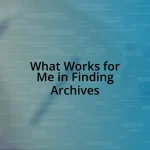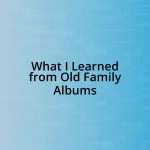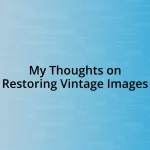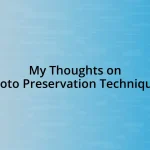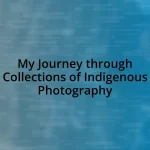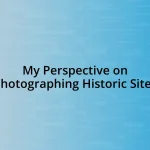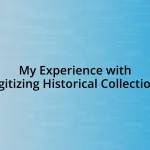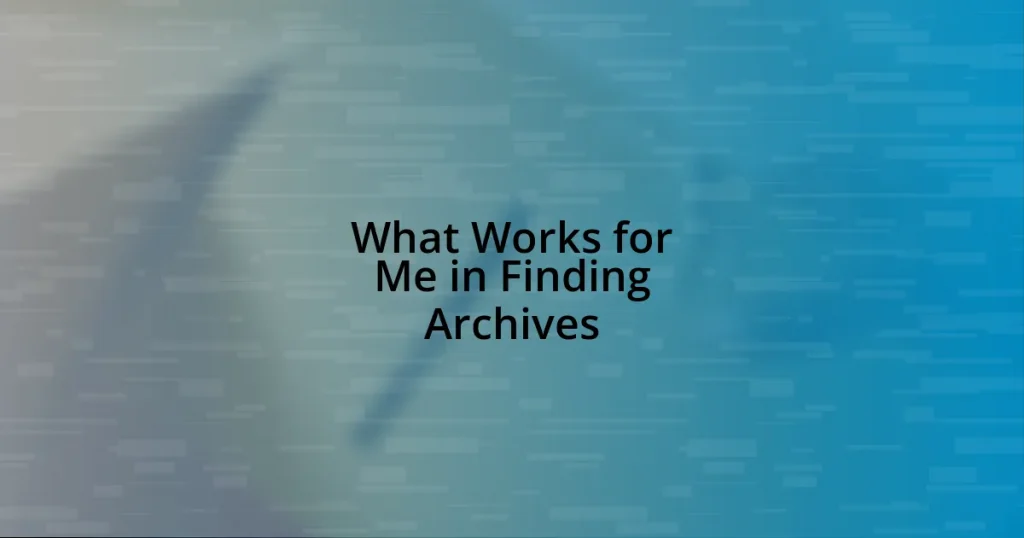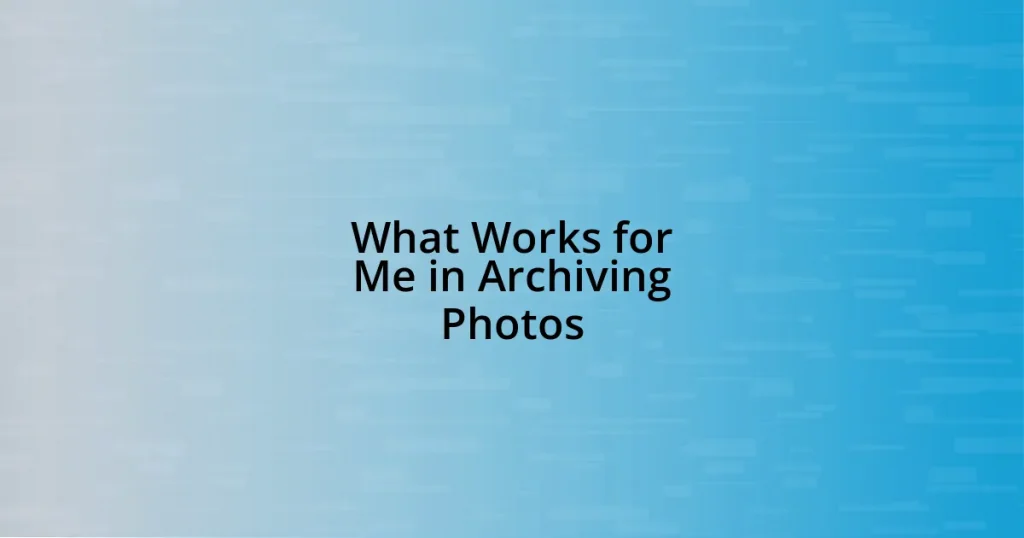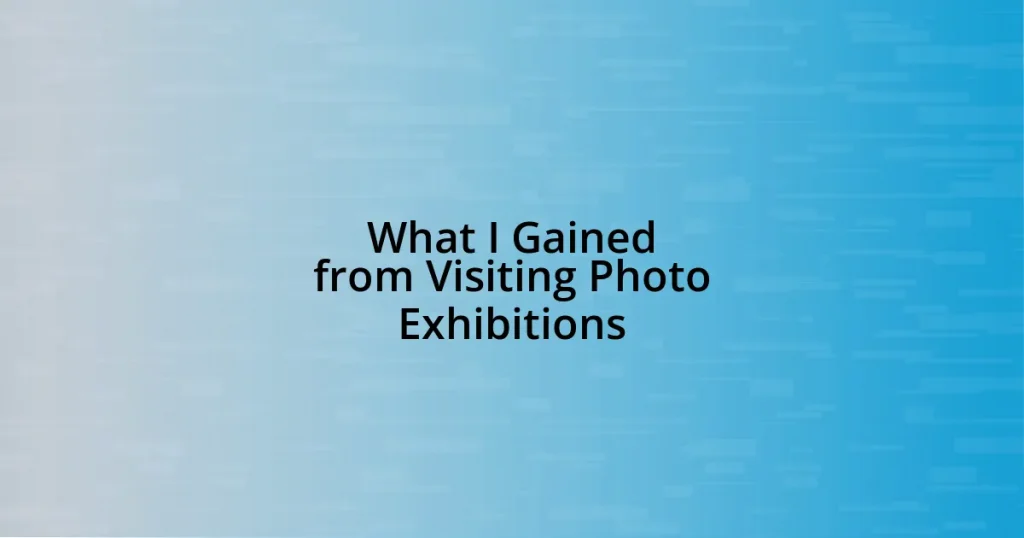Key takeaways:
- Archives play a crucial role in preserving collective memory, allowing us to learn from the past and uncover personal stories.
- Understanding different types of archives (institutional, government, personal, special collections, and digital) helps tailor research strategies.
- Effective searching involves setting clear goals, knowing the right sources, and staying flexible to discover unexpected information.
- Connecting with archive professionals and local historical societies enhances research with expert guidance and enriching stories.
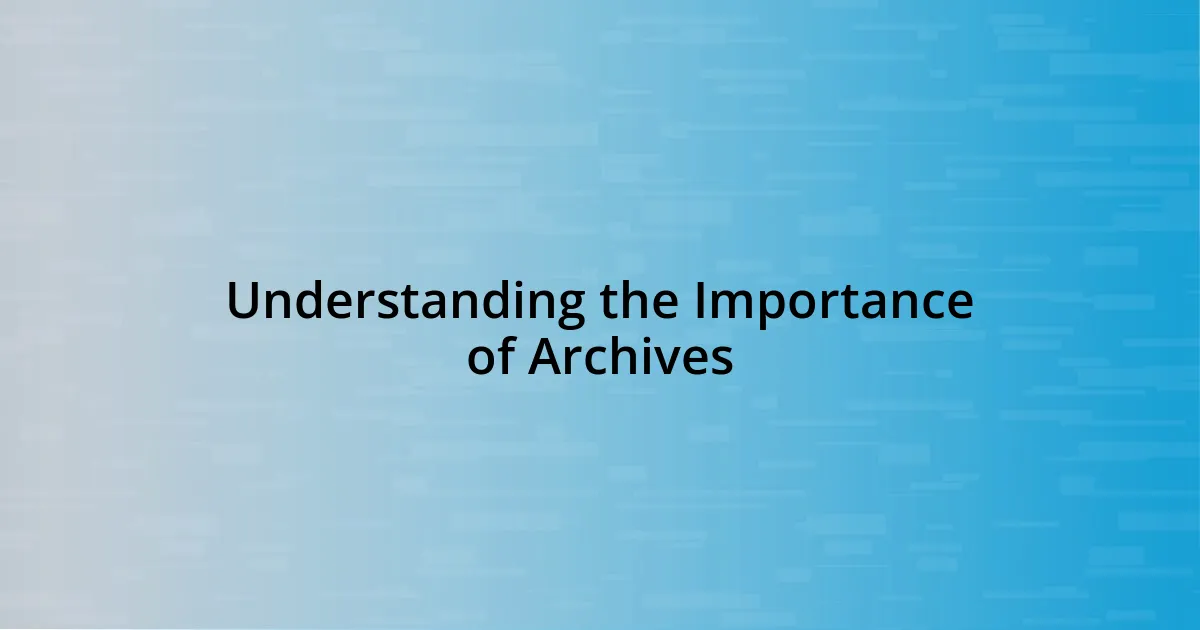
Understanding the Importance of Archives
Archives matter more than many people realize. They aren’t just dusty old boxes full of forgotten papers; they serve as a bridge to our past, holding the stories and experiences that shape our identity. I remember sifting through my grandmother’s letters in the attic, feeling a connection to her life that I never anticipated. How often do we overlook the treasure troves of stories tucked away, waiting to be uncovered?
When I think about archives, I often feel a blend of nostalgia and curiosity. Each document has the potential to reveal nuances of history that textbooks simply can’t capture. Have you ever wondered what untold stories your family’s past holds? That sense of discovery fuels my passion for exploring archives. They give voice to the voiceless and offer perspective on events that have shaped our societies.
Ultimately, understanding the importance of archives means recognizing their role in preserving our collective memory. They allow us to learn from our mistakes and celebrate our achievements. I feel an exhilaration every time I make a new find—it’s like piecing together a giant jigsaw puzzle, bringing clarity to the complexities of life. Isn’t that what we all seek?
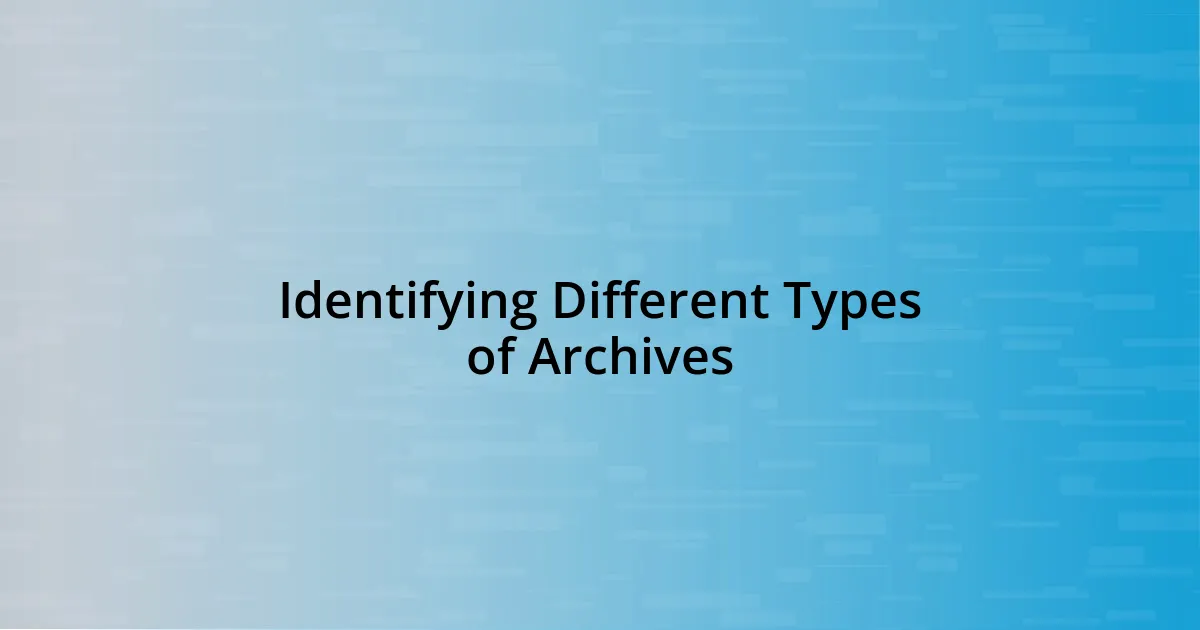
Identifying Different Types of Archives
When diving into the world of archives, it’s essential to recognize that not all archives are created equal. Each type has its unique purpose and focus. I remember once stumbling upon a local historical society’s archive. It was a small room packed with documents and photographs, showcasing the community’s history in vivid detail. That personal discovery highlighted the difference between local archives and larger institutional collections.
Here’s a handy list of different types of archives you might encounter:
-
Institutional Archives: These are maintained by organizations, such as universities and corporations, preserving records relevant to their functions. They often contain administrative documents, financial records, and significant communications.
-
Government Archives: Typically vast, these archives store official records and documents from various levels of government. They can offer insight into political decisions, societal issues, and historical events.
-
Personal Archives: Comprising letters, diaries, and memorabilia, personal archives preserve an individual’s or family’s history. I often find that these collections evoke strong emotions, connecting us to our roots.
-
Special Collections: Often found within libraries, these archives focus on a particular subject, era, or format, like rare books and manuscripts. I can still feel the thrill of perusing a collection dedicated to my favorite author.
-
Digital Archives: With the rise of technology, many archives now exist online, making access easier than ever. While researching, I was amazed at how quickly I could find digitized documents that previously required hours of searching.
Understanding these categories helps tailor your research approach, making the process of finding valuable resources less daunting and more rewarding.
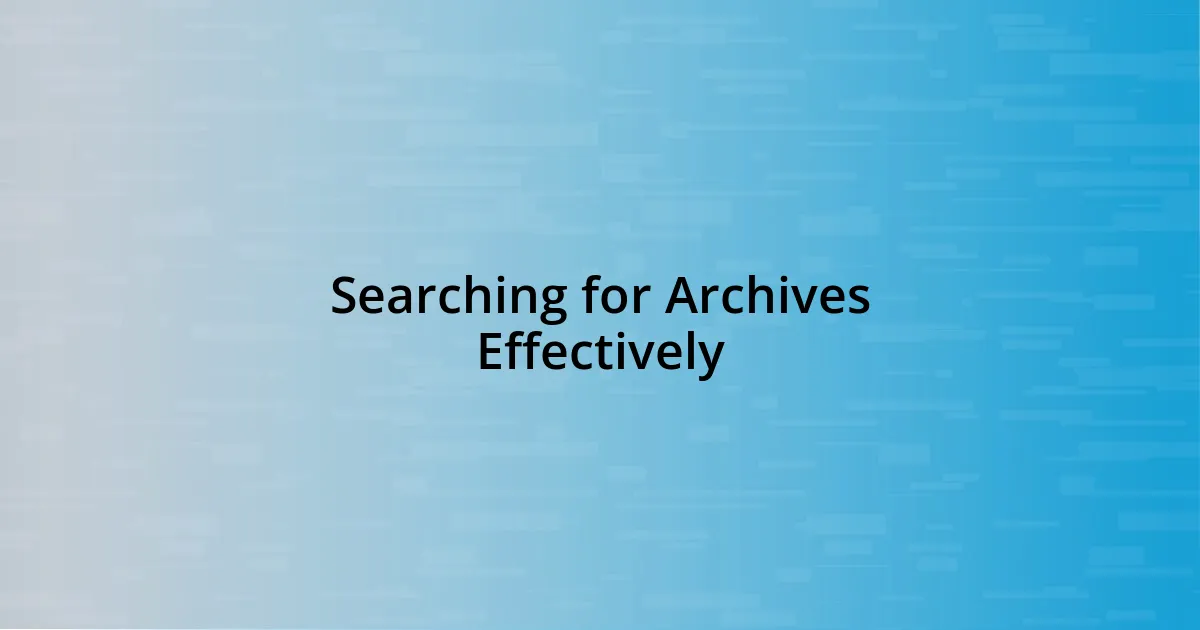
Searching for Archives Effectively
Searching for archives effectively requires a strategic approach to ensure you make the most of your search. From my experience, the first step is to clearly define what you’re hoping to find. Are you looking for a specific document, or do you want a broader understanding of a topic? When I was researching my family history, narrowing down my focus helped tremendously. I started without a particular aim, but once I set clear objectives, my searches became much more fruitful.
It’s also invaluable to understand where to search. Not all archives are easily accessible. For instance, I once spent a frustrating afternoon at a large national archive, only to find that many records were digitized and available online instead. It was an eye-opener! I learned that knowing the right platforms—like specialized databases or local historical societies—can save a lot of time. Having a mental checklist of potential sources can guide you in the right direction and make the search easier.
Lastly, flexibility plays a crucial role in effective searching. Sometimes, you may not find exactly what you are looking for, which is completely normal. I recall a moment when I stumbled upon unexpected records while searching for something else entirely. Those hidden gems can lead to fascinating discoveries that you might never have considered. There’s a thrill in the chase of information, and being open to different paths can yield surprising and rewarding results.
| Searching Technique | Description |
|---|---|
| Define Your Goals | Identify what you’re looking for to streamline your search and focus your efforts. |
| Know Your Sources | Research various types of archives and databases to find the right fit for your needs. |
| Stay Flexible | Be open to unexpected finds during your search; they can lead to exciting discoveries. |
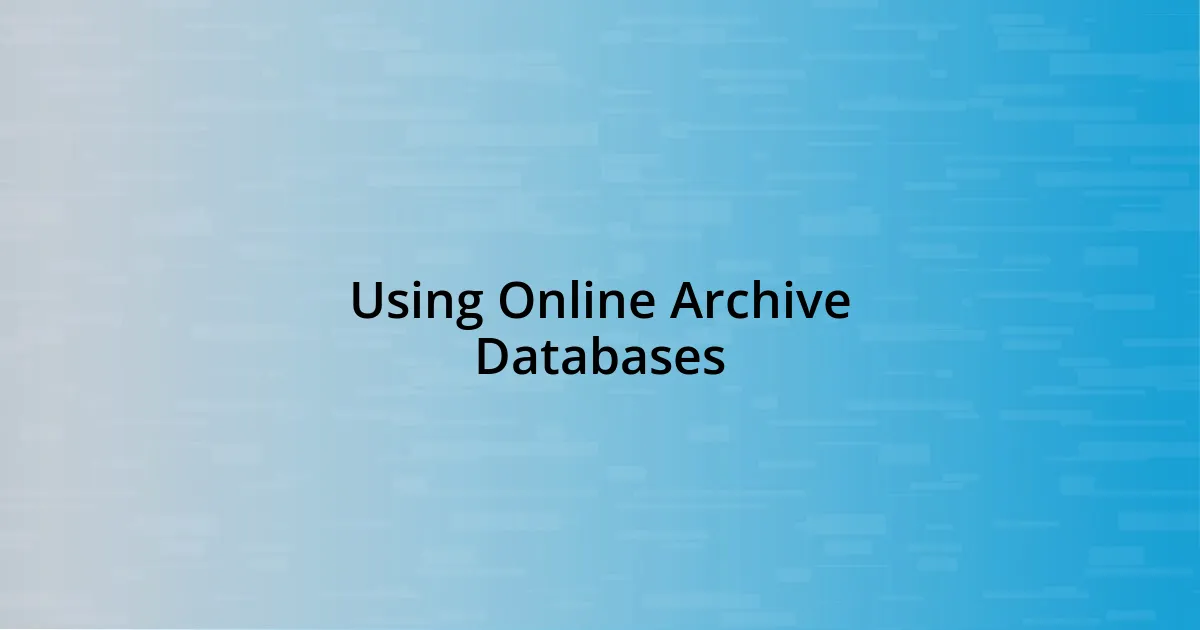
Using Online Archive Databases
Using online archive databases can be a game-changer for anyone diving into research. I vividly recall the excitement I felt when I first accessed a massive digital archive filled with newspaper clippings from over a century ago. The interface was user-friendly, which made exploring articles about local events and notable figures an absolute joy. Have you ever stumbled upon an article that made you feel connected to the past? That moment can make historical research incredibly fulfilling.
When navigating these databases, I’ve learned the importance of using specific search filters. For instance, while looking for records related to my great-grandfather, I quickly realized that broad searches yielded overwhelming results. Instead, refining my search by including dates or keywords related to his profession helped me find documents that truly mattered. Have you ever tried searching for something online only to drown in a sea of irrelevant results? It’s a common pitfall, but mastering those filters not only saves time but also enhances the overall research experience.
It’s worth noting that not all online archives are created equal. Some might offer rich metadata and detailed descriptions, while others can be sparse, leaving you to sift through the bits and pieces. I remember feeling a sense of letdown when a promising database turned out to have limited content. In moments like these, I encourage exploring multiple databases. Each one can offer a different perspective or uncover surprising pieces of information. Don’t hesitate to switch gears and try new approaches—after all, finding archives is often a journey filled with unexpected discoveries!
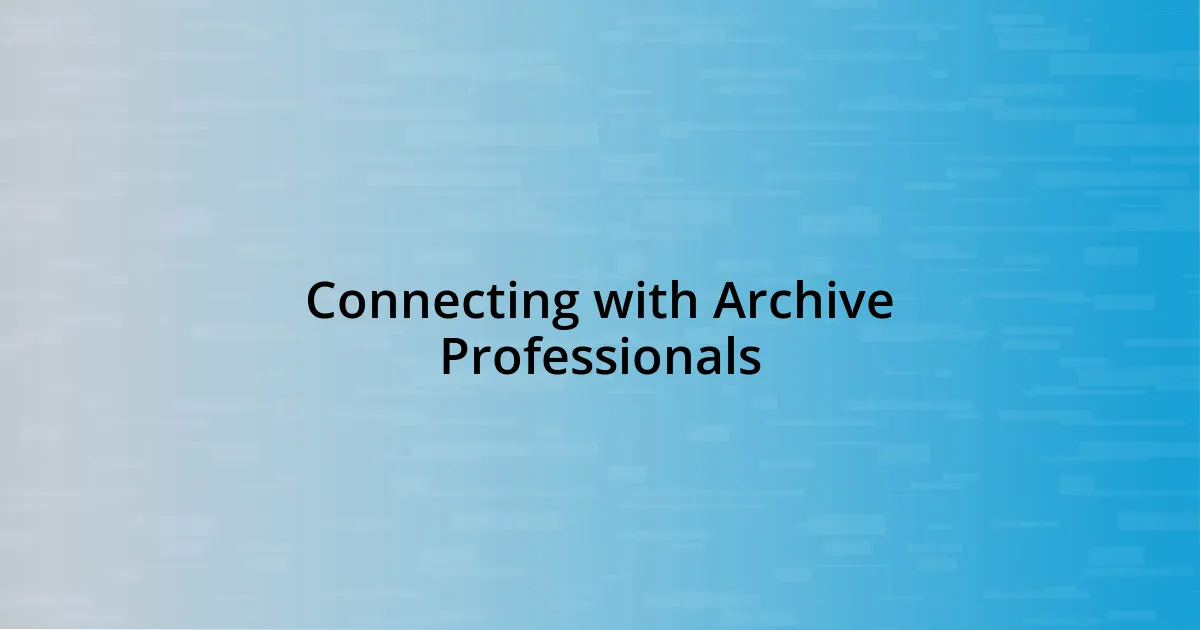
Connecting with Archive Professionals
Connecting with archive professionals can significantly enhance your research journey. I remember feeling a bit overwhelmed the first time I reached out to an archivist. Their knowledge and willingness to guide me were incredibly reassuring. Have you ever hesitated to ask for help, thinking you’d be a bother? I learned early on that these professionals genuinely want to share their expertise. So, don’t shy away from reaching out!
One of my most memorable experiences was connecting with a local historian while researching a community event. Not only did she provide me with access to hidden archives, but her passion for the subject was infectious. It reminded me that these professionals often have stories and insights that go beyond mere facts. Have you ever discovered a layer of information you didn’t expect simply by having a conversation? Engaging with them can unlock pathways to information you might not have found otherwise.
Furthermore, attending workshops or lectures hosted by archives isn’t just educational; it’s an opportunity to network. I once met a fellow researcher at an event, and we’ve collaborated ever since. The support and camaraderie within the archival community can be exhilarating. Imagine tapping into a network of knowledgeable individuals who share your passion! I truly believe that connecting with archive professionals enhances the richness of any research endeavor.
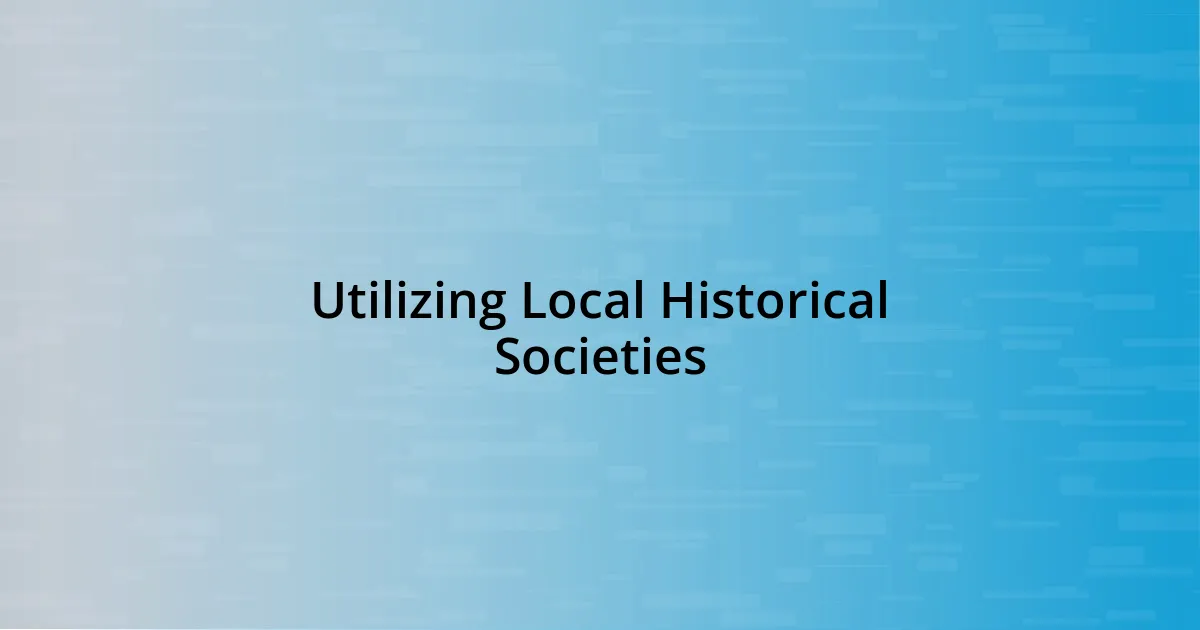
Utilizing Local Historical Societies
Local historical societies can be treasure troves for anyone interested in uncovering the past. I remember my first visit to a small historical society in my hometown; I felt a palpable excitement walking through the doors, surrounded by shelves of old photographs and documents. It was like stepping back in time. Have you ever felt that thrill when you hold something that belonged to a distant relative? The personal connection you make with these artifacts can be truly profound.
As I started to explore their collections, I was pleasantly surprised by the enthusiastic volunteers eager to share their knowledge. They guided me through local narratives and pointed out hidden gems I never would have found on my own. One volunteer even shared personal stories about growing up in the same community, which added a rich layer of context to my research. Isn’t it amazing how a simple conversation can breathe life into historical facts? Those stories made the archives come alive, transforming cold data into a vibrant tapestry of experiences.
While I was researching a significant local event, I stumbled upon a scrapbook filled with newspaper articles, letters, and photographs documenting the occasion. The historical society had preserved it with such care, allowing me to experience the event through the eyes of those who lived it. Have you ever uncovered something unexpected that shifted your understanding of a topic? I was moved, realizing how local historical societies don’t just archive history; they keep the community’s spirit alive. Engaging with them not only deepens your research but also nurtures a sense of belonging to that rich history.

Documenting Findings for Future Use
Documenting your findings isn’t just about jotting down what you’ve discovered; it’s about creating a resource for your future self. I often find myself revisiting my notes from past projects, sparking memories and insights that guide my current work. Have you ever had a “Eureka!” moment when looking back and realizing you’d overlooked something brilliant? This is why I emphasize keeping detailed records, not just the facts, but also your thoughts and feelings during the research process.
I keep a dedicated research journal where I document my findings, questions, and connecting themes. One time, while flipping through my entries about a particular archive, I came across a sketch I had made during my visit. It was a simple drawing of an object I found intriguing, but revisiting it reignited my passion for that project. Don’t underestimate how visual elements, like sketches or photographs, can enhance your documentation and even trigger new ideas. What methods do you use to capture your discoveries?
In addition to my journal, I also organize digital files for each project. I use folders that categorize materials by themes, sources, or timelines. When I was preparing for a presentation, having everything neatly organized saved me countless hours. The clarity it brings allows me to focus on creating a compelling narrative, rather than scrambling to find documents. Have you ever felt the relief of being organized? It’s a game-changer, isn’t it? Structured documentation transforms chaotic research into a coherent story, laying a foundation for future inquiries.

